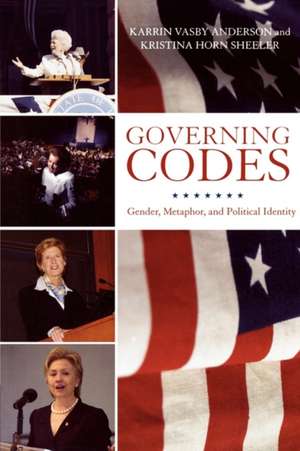Governing Codes: Lexington Studies in Political Communication
Autor Karrin Vasby Anderson, Kristina Horn Sheeleren Limba Engleză Paperback – 29 aug 2005
| Toate formatele și edițiile | Preț | Express |
|---|---|---|
| Paperback (1) | 427.57 lei 6-8 săpt. | |
| Rowman & Littlefield – 29 aug 2005 | 427.57 lei 6-8 săpt. | |
| Hardback (1) | 686.57 lei 6-8 săpt. | |
| Rowman & Littlefield – 23 aug 2005 | 686.57 lei 6-8 săpt. |
Din seria Lexington Studies in Political Communication
-
 Preț: 403.00 lei
Preț: 403.00 lei -
 Preț: 445.03 lei
Preț: 445.03 lei -
 Preț: 469.08 lei
Preț: 469.08 lei -
 Preț: 447.57 lei
Preț: 447.57 lei -
 Preț: 444.70 lei
Preț: 444.70 lei -
 Preț: 441.18 lei
Preț: 441.18 lei -
 Preț: 424.08 lei
Preț: 424.08 lei - 23%
 Preț: 698.88 lei
Preț: 698.88 lei -
 Preț: 401.77 lei
Preț: 401.77 lei -
 Preț: 448.72 lei
Preț: 448.72 lei -
 Preț: 467.17 lei
Preț: 467.17 lei -
 Preț: 440.82 lei
Preț: 440.82 lei -
 Preț: 447.57 lei
Preț: 447.57 lei -
 Preț: 450.85 lei
Preț: 450.85 lei -
 Preț: 492.19 lei
Preț: 492.19 lei -
 Preț: 450.47 lei
Preț: 450.47 lei -
 Preț: 450.67 lei
Preț: 450.67 lei - 23%
 Preț: 464.45 lei
Preț: 464.45 lei -
 Preț: 424.50 lei
Preț: 424.50 lei - 27%
 Preț: 978.56 lei
Preț: 978.56 lei -
 Preț: 447.57 lei
Preț: 447.57 lei - 23%
 Preț: 698.12 lei
Preț: 698.12 lei -
 Preț: 448.34 lei
Preț: 448.34 lei -
 Preț: 436.77 lei
Preț: 436.77 lei -
 Preț: 523.02 lei
Preț: 523.02 lei -
 Preț: 434.34 lei
Preț: 434.34 lei - 23%
 Preț: 658.36 lei
Preț: 658.36 lei - 23%
 Preț: 700.68 lei
Preț: 700.68 lei -
 Preț: 449.53 lei
Preț: 449.53 lei - 27%
 Preț: 735.69 lei
Preț: 735.69 lei - 27%
 Preț: 816.60 lei
Preț: 816.60 lei - 27%
 Preț: 816.03 lei
Preț: 816.03 lei
Preț: 427.57 lei
Nou
Puncte Express: 641
Preț estimativ în valută:
81.82€ • 89.23$ • 68.99£
81.82€ • 89.23$ • 68.99£
Carte tipărită la comandă
Livrare economică 24 aprilie-08 mai
Preluare comenzi: 021 569.72.76
Specificații
ISBN-13: 9780739111994
ISBN-10: 073911199X
Pagini: 244
Dimensiuni: 154 x 225 x 19 mm
Greutate: 0.39 kg
Ediția:New.
Editura: Rowman & Littlefield
Seria Lexington Studies in Political Communication
ISBN-10: 073911199X
Pagini: 244
Dimensiuni: 154 x 225 x 19 mm
Greutate: 0.39 kg
Ediția:New.
Editura: Rowman & Littlefield
Seria Lexington Studies in Political Communication
Notă biografică
Karrin Vasby Anderson is assistant professor of speech communication at Colorado State University. Kristina Horn Sheeler is assistant professor of communication studies at Indiana University-Purdue University Indianapolis.
Descriere
Descriere de la o altă ediție sau format:
Governing Codes examines the political identity of four contemporary U.S. political figures--Democrats Ann Richards and Hillary Rodham Clinton and Republicans Christine Todd Whitman and Elizabeth Dole--illustrating how metaphor plays a central role in the construction of public identity in U.S. politics. Anderson and Sheeler analyze how familiar na
Governing Codes examines the political identity of four contemporary U.S. political figures--Democrats Ann Richards and Hillary Rodham Clinton and Republicans Christine Todd Whitman and Elizabeth Dole--illustrating how metaphor plays a central role in the construction of public identity in U.S. politics. Anderson and Sheeler analyze how familiar na
